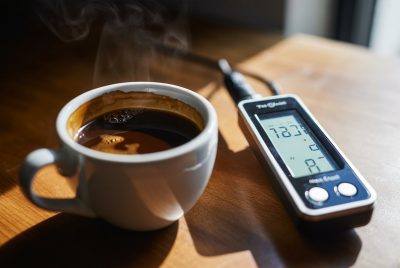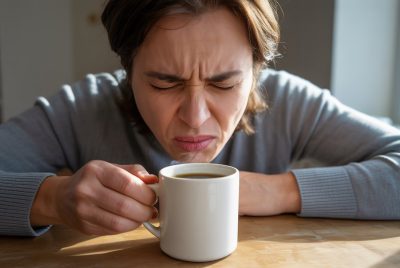Coffee Without Sleep Loss: Your Guide to Better Rest
*We may earn a commission for purchases made using our links. Please see our disclosure to learn more.
The aroma of freshly brewed coffee fills the kitchen as millions of people worldwide start their day with their beloved cup of joe. Yet, for many coffee enthusiasts, the relationship with caffeine becomes a delicate balancing act—craving that perfect cup while desperately wanting a good night’s sleep. The struggle is real: how can you enjoy your favorite beverage without sacrificing precious rest?
Key Takeaways
- Timing is everything: Stop consuming caffeine 6-8 hours before bedtime
- Individual sensitivity varies: Some people metabolize caffeine faster than others
- Quality matters: Choose high-quality coffee and avoid excessive additives
- Alternatives exist: Decaf and herbal options can satisfy evening cravings
- Sleep hygiene works: Combining smart caffeine habits with good sleep practices maximizes rest quality
“The relationship between caffeine and sleep is not about elimination—it’s about understanding your body’s unique rhythm and making informed choices that honor both your love for coffee and your need for restorative sleep.”
– Sleep Research Foundation
Understanding Your Body’s Caffeine Journey
Coffee lovers often find themselves caught in a cycle of dependence, reaching for another cup when energy dips, only to find themselves staring at the ceiling hours later. This pattern affects millions of people who genuinely love coffee but struggle with its impact on sleep quality.
The transformation begins with understanding how caffeine works in your system. Caffeine blocks adenosine receptors in your brain—adenosine being the chemical that makes you feel tired. When caffeine occupies these receptors, you don’t feel sleepy, even when your body naturally should. The half-life of caffeine varies from person to person, typically ranging from 3-7 hours, meaning half of the caffeine you consume could still be active in your system long after you’ve finished your cup.
The Science Behind Caffeine Metabolism
Your genetic makeup plays a crucial role in how quickly you process caffeine. Some people are “fast metabolizers” who can drink coffee in the evening with minimal sleep impact, while others are “slow metabolizers” who feel caffeine’s effects for many hours. Factors influencing your caffeine sensitivity include:
- Genetics: Variations in the CYP1A2 gene affect caffeine metabolism speed
- Age: Metabolism generally slows with age
- Body weight: Larger individuals may process caffeine differently
- Medications: Certain drugs can slow caffeine breakdown
- Pregnancy: Dramatically slows caffeine metabolism
- Liver health: Affects processing efficiency
Three Key Strategies for Coffee-Sleep Harmony
Strategy 1: Master the Timing Game
The most transformative change many coffee enthusiasts make is establishing a caffeine cutoff time. The “6-hour rule” suggests stopping all caffeine consumption at least six hours before bedtime, though some people need 8-10 hours for complete caffeine clearance.
Implementation steps:
- Track your current coffee consumption times for one week
- Calculate backwards from your desired bedtime
- Gradually shift your last cup earlier by 30 minutes each day
- Replace afternoon coffee with alternatives when cravings hit
Emotional impact: Initially, this adjustment might feel restrictive, especially if afternoon coffee represents a cherished ritual. However, most people report feeling more naturally tired at bedtime and experiencing deeper, more restorative sleep within 1-2 weeks.
Common obstacles: The 3 PM energy crash often derails good intentions. Combat this by staying hydrated, taking short walks, or having a protein-rich snack instead of reaching for coffee.
Strategy 2: Quality Over Quantity Approach
Focusing on coffee quality rather than quantity can dramatically improve both your coffee experience and sleep quality. High-quality, freshly roasted beans often provide more satisfaction per cup, reducing the need for multiple servings throughout the day.
What this looks like:
- Choose single-origin, freshly roasted beans
- Invest in proper brewing equipment
- Measure coffee-to-water ratios precisely
- Savor each cup mindfully rather than drinking habitually
Physical and emotional benefits: Better coffee quality often means you’ll feel more satisfied with fewer cups. The ritual of preparing quality coffee can become a meditative practice, replacing the mindless consumption that often leads to overcaffeination.
Integration challenges: Quality coffee costs more upfront, but many find they spend less overall by drinking fewer, better cups. The key is viewing coffee as a craft rather than just a caffeine delivery system.
Strategy 3: Smart Substitution Systems
Developing a repertoire of satisfying alternatives for times when you crave coffee but want to protect your sleep creates flexibility in your routine.
Evening alternatives include:
- High-quality decaf coffee with the same brewing ritual
- Herbal teas with complex flavors (rooibos, chamomile blends)
- Golden milk with turmeric and warming spices
- Mushroom coffee alternatives
- Warm almond or oat milk with cinnamon
The psychological aspect: Often, the craving for coffee is actually a desire for warmth, ritual, or a moment of pause. These alternatives can fulfill those needs without the sleep-disrupting effects of caffeine.
Addressing Common Coffee-Sleep Challenges
Challenge 1: The Afternoon Energy Crash
Many people experience a natural dip in energy between 2-4 PM, leading to desperate reaches for caffeinated beverages. This crash often results from poor morning nutrition, dehydration, or natural circadian rhythms.
Solutions:
- Eat a protein-rich lunch to stabilize blood sugar
- Take a 10-20 minute walk outside for natural light exposure
- Practice deep breathing or brief meditation
- Stay consistently hydrated throughout the day
Challenge 2: Social and Work Coffee Culture
Office coffee breaks and social coffee dates can make it challenging to stick to caffeine timing goals.
Strategies:
- Suggest morning coffee meetings instead of afternoon ones
- Order decaf or alternatives during evening social gatherings
- Bring your own herbal tea to office gatherings
- Communicate your sleep goals to supportive friends and colleagues
Challenge 3: Withdrawal Symptoms
Reducing caffeine intake can temporarily cause headaches, fatigue, and irritability.
Management techniques:
- Gradually reduce intake rather than stopping abruptly
- Stay extra hydrated during the transition period
- Get adequate sleep and nutrition to support your body
- Consider temporary use of natural energy supporters like B-vitamins
Creating Your Personal Coffee-Sleep Blueprint
Morning Optimization
Start your day with coffee when cortisol levels naturally support alertness. The optimal window is typically 90-120 minutes after waking, allowing your natural cortisol awakening response to occur first.
Morning routine suggestions:
- Hydrate with water immediately upon waking
- Get 10-15 minutes of natural light exposure
- Have coffee with or after breakfast for better absorption
- Choose lighter roasts earlier in the day for sustained energy
Afternoon Transition
As the day progresses, transition from caffeinated to caffeine-free beverages while maintaining satisfying rituals.
Transition strategies:
- Keep a “coffee journal” tracking how different timing affects your sleep
- Experiment with half-caff blends as bridges
- Create new afternoon rituals around herbal teas or walks
- Use aromatherapy (coffee-scented candles) to satisfy sensory cravings
Evening Wind-Down
Establish caffeine-free evening routines that signal to your body it’s time to prepare for sleep.
Wind-down elements:
- Warm, caffeine-free beverages 1-2 hours before bed
- Dim lighting and electronic device restrictions
- Gentle stretching or reading
- Consistent bedtime regardless of caffeine consumption patterns
The Broader Impact on Wellbeing and Lifestyle
When people successfully balance their coffee love with good sleep hygiene, the positive effects extend far beyond just feeling rested. Quality sleep enhances mood stability, immune function, cognitive performance, and emotional resilience. Many report improved relationships, better work performance, and increased motivation for healthy habits.
The journey also teaches valuable lessons about mindful consumption and body awareness. Learning to tune into your body’s signals—recognizing true tiredness versus caffeine withdrawal, understanding your personal metabolism patterns, and honoring your need for rest—creates a foundation for other healthy lifestyle choices.
Productivity and Focus Benefits
Contrary to fears about reducing caffeine, most people find their focus and productivity actually improve when they optimize their coffee-sleep balance. Quality sleep enhances cognitive function more than additional caffeine can, leading to:
- Better decision-making abilities
- Improved memory consolidation
- Enhanced creative problem-solving
- More stable energy levels throughout the day
- Reduced reliance on external stimulants
Relationship and Social Benefits
Better sleep quality often translates to improved mood and patience, positively affecting relationships. Additionally, being intentional about coffee consumption can lead to more meaningful social interactions—choosing quality coffee dates over rushed caffeine fixes, or sharing herbal tea rituals with family in the evening.
Practical Advice for Every Stage of Your Journey
For Coffee Newcomers
If you’re just developing a relationship with coffee, you have the advantage of establishing healthy patterns from the beginning:
- Start with small amounts to assess your sensitivity
- Establish a cutoff time before dependence develops
- Choose quality over quantity from day one
- Learn to appreciate coffee as a beverage, not just a drug
For Moderate Coffee Drinkers
Those who enjoy 1-3 cups daily often need minor adjustments rather than major overhauls:
- Fine-tune your timing based on sleep quality feedback
- Experiment with brewing methods to maximize satisfaction
- Develop go-to alternatives for late-day cravings
- Track patterns between coffee consumption and sleep quality
For Heavy Coffee Consumers
People drinking 4+ cups daily or consuming caffeine late in the day face bigger challenges but can see dramatic improvements:
- Plan a gradual reduction strategy over 2-4 weeks
- Address underlying fatigue causes (nutrition, stress, sleep debt)
- Seek support from healthcare providers if needed
- Celebrate small victories in timing improvements
For Those with Sleep Disorders
Individuals with insomnia, sleep apnea, or other sleep conditions need extra caution:
- Consult healthcare providers about caffeine’s role in sleep issues
- Consider eliminating caffeine temporarily to assess impact
- Focus on sleep hygiene basics alongside caffeine management
- Monitor how caffeine interacts with sleep medications or treatments
Reflecting on Your Personal Coffee Journey
Take a moment to consider your current relationship with coffee and sleep. What patterns do you notice? When do you reach for coffee—is it habit, genuine enjoyment, or energy desperation? How do you feel the morning after a good night’s sleep versus after a restless night?
Consider these reflection questions:
- What would change in your life if you slept better consistently?
- Which coffee moments bring you genuine joy versus those that are purely functional?
- How might your energy levels change if you optimized your caffeine timing?
- What alternatives could satisfy your evening comfort beverage needs?
Embracing Both Success and Setbacks
The journey to balance coffee enjoyment with quality sleep isn’t linear. There will be days when you miscalculate timing, evenings when you choose coffee over sleep, and periods when life circumstances disrupt your routine. These experiences are normal and valuable learning opportunities.
Common setbacks include:
- Travel disrupting established routines
- Stressful periods increasing caffeine dependence
- Social situations conflicting with caffeine timing goals
- Seasonal changes affecting sleep patterns and coffee cravings
Recovery strategies:
- Return to your routine without self-judgment
- Adjust expectations during challenging life phases
- Use setbacks as data about what works and what doesn’t
- Maintain perspective that perfect consistency isn’t the goal—sustainable balance is
Celebrating Small Wins in Your Coffee-Sleep Balance
Acknowledge progress in small increments. Perhaps you moved your last cup 30 minutes earlier, chose herbal tea over coffee one evening, or slept better after adjusting your routine. These victories, however small, represent meaningful steps toward better health and wellbeing.
Ways to celebrate progress:
- Keep a sleep and energy journal to track improvements
- Share successes with supportive friends or family
- Invest in quality sleep accessories as rewards for consistency
- Take photos of beautiful herbal tea preparations or quality coffee setups
- Notice and appreciate improved morning energy levels
The Ripple Effect: How Coffee-Sleep Balance Affects Everything Else
When you successfully balance coffee enjoyment with quality sleep, the positive effects ripple through every aspect of life. Better sleep enhances immune function, making you less susceptible to illness. Improved energy stability reduces the need for sugar crashes and junk food fixes. Enhanced mood and patience strengthen relationships and work performance.
Many people find that mastering this balance gives them confidence to address other health goals—exercise routines, nutrition improvements, stress management techniques. The skills you develop—mindful consumption, body awareness, delayed gratification, and routine optimization—transfer to numerous other areas of personal development.
Your Path Forward: Creating Sustainable Coffee-Sleep Harmony
The goal isn’t to eliminate coffee or achieve perfect sleep immediately. Instead, focus on creating a sustainable relationship with both that honors your genuine enjoyment of coffee while prioritizing the restorative sleep your body needs.
Start with small, manageable changes. Perhaps this week, you’ll move your last cup 30 minutes earlier. Next week, you might experiment with a delicious herbal tea for evening comfort. The following week, you could track your sleep quality in relation to caffeine timing.
Remember that everyone’s optimal balance looks different. Some people thrive with one morning cup, others enjoy coffee throughout the morning hours. Some find decaf satisfying in the evening, others prefer herbal alternatives. The key is discovering your personal formula through patient experimentation and honest self-assessment.
Your journey toward better coffee-sleep harmony is ultimately a journey toward greater self-awareness, improved health, and more intentional living. By honoring both your love for coffee and your need for quality sleep, you’re creating a foundation for sustained energy, better mood, and enhanced wellbeing that will benefit you for years to come.
The path forward is yours to design, one mindful cup and one restful night at a time.
Frequently Asked Questions
Q: How long should I wait after my last cup of coffee before going to bed?
A: Most sleep experts recommend waiting at least 6-8 hours between your last caffeine intake and bedtime. However, this varies significantly between individuals. Some people need only 4-5 hours, while others require 10-12 hours for complete caffeine clearance. Start with the 6-hour rule and adjust based on your sleep quality and how easily you fall asleep.
Q: Can I drink decaf coffee in the evening without affecting my sleep?
A: Generally, yes. Decaf coffee contains only 2-5mg of caffeine per cup (compared to 95mg in regular coffee), which is unlikely to affect sleep for most people. However, be mindful that decaf still contains trace amounts of caffeine, and some individuals are extremely sensitive. Also, avoid adding sugar or other stimulating ingredients to evening decaf drinks.
Q: Why do I still feel tired even after cutting back on afternoon coffee?
A: This is normal during the adjustment period. Your body has become accustomed to caffeine’s energy boost, and it takes 1-2 weeks to adapt to functioning without it. During this transition, focus on other energy-supporting strategies: stay hydrated, eat regular protein-rich meals, get natural sunlight, and ensure you’re getting adequate sleep. The natural energy will return as your body adjusts.
Q: Is it better to quit coffee completely if I have sleep problems?
A: Not necessarily. For most people, strategic timing adjustments rather than complete elimination solve sleep issues while preserving coffee enjoyment. However, if you have severe insomnia or other sleep disorders, consider temporarily eliminating all caffeine for 2-3 weeks to assess its impact. Work with a healthcare provider to determine if caffeine is significantly contributing to your sleep problems.
Q: What are the best caffeine-free alternatives that still feel satisfying?
A: Popular satisfying alternatives include: high-quality decaf coffee (maintains the ritual and flavor), rooibos tea (naturally caffeine-free with robust flavor), golden milk with turmeric and spices, mushroom-based coffee alternatives, and herbal blends like chamomile-lavender or peppermint tea. The key is finding alternatives that satisfy both the physical warmth and the psychological comfort that coffee provides.




